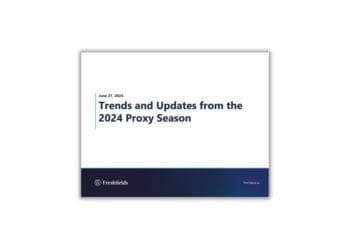As corporate boards gather for annual shareholder meetings, the issues in the spotlight are defined by forces driving both business growth and risk. BDO’s Amy Rojik offers suggestions for how boards can be prepared to communicate with stakeholders this year.
For corporate boards, spring marks the arrival of annual shareholder meeting season. Every year, shareholders gather for board meetings armed with questions and concerns that, if not sufficiently addressed, may hamper their confidence in a business’s ability to manage risk and sustain long-term value creation.
In 2019, the list of issues on boards’ radars are defined by the forces driving both business growth and risk, in equal measure. This year’s key areas of shareholder concern can be grouped into four categories: digital transformation and data protection, people and culture, market movement and regulation and reporting. Here are some suggestions for how boards can address them.
Digital Transformation & Data Protection
With organizations facing increasing pressure to streamline and optimize every aspect of their business, digital transformation is at the crux of business innovation. As a result, it is nearly impossible to walk into a boardroom without hearing the phrase mentioned. And for good reason — having a digital transformation strategy is no longer optional; it is necessary for survival in today’s digital economy. Corporate boards should expect shareholders to question how much is being spent on digital transformation, who is leading the charge on strategy, what the return on investment is and how the organization compares to its peers. In communicating a digital strategy to stakeholders, linking it to clear key performance indicators (KPIs) and business objectives is critical.
However, with increased digital opportunity comes increased digital threats. Growing in both frequency and sophistication, cyberattacks continue to undermine public trust in businesses — and they are becoming exponentially more costly to navigate. In fact, the SEC reports that the average cost of a cyber data breach is $7.5 million and rising each year.
Further, as emphasis on cybersecurity concerns escalates, so does the interest in how the large amounts of data generated and maintained in the digital economy are being protected. Increasing data privacy and data protection regulations internationally (e.g., GDPR) and at the state level (e.g., California Consumer Privacy Act) are redefining the way sensitive consumer information should be handled and protected.
With large amounts of data being the target of cyber breaches and the significant reputational and financial damage breaches can cause, shareholders will be eager to learn how the company’s board is approaching these issues and managing related risks. Board members should be prepared to clearly communicate the organization’s proactive risk mitigation strategies to stakeholders — including shareholders, regulators, employees, customers and others. In the face of such risk, outlining a proactive game plan is an essential step toward building market confidence and offsetting damage when a breach does occur.
People & Culture
Shareholders are beginning to focus more closely on the ways corporate boards are driving a positive culture within their organization. No longer is communicating the organization’s stance on topics such as talent management, executive compensation and overall corporate culture simply a best practice. With shareholders growing more interested in supporting socially responsible organizations and at the same time more aware of the impact these issues have on an organization’s bottom line, readiness to engage in a discussion of social and cultural topics at annual board meetings is prudent.
One aspect of corporate culture receiving particular attention at 2019 shareholder meetings is leadership diversity. According to McKinsey & Company, companies in the top 25th percentile for gender diversity in management positions are 21 percent more likely to experience above-average profits. At the same time, the world’s largest proxy advisory firms, Institutional Shareholder Services (ISS) and Glass Lewis, have both recently updated policies to prioritize diversity within the board, particularly with respect to gender, which will influence their corporate governance disclosure reviews and subsequent shareholder voting recommendations.
Given the prominence of this topic, shareholders may want to know where companies stand in relation to the highly publicized California Senate Bill 826 and proxy advisory policy updates, as well as their policies around formal diversity reviews. Organizations and their boards are encouraged to consider the strength of their current board refreshment and recruitment policies and related proxy disclosures, extending discussions around board diversity beyond consideration of gender and ensuring an array of diverse viewpoints.
Market Movement
Amid one of the longest bull markets in history, many analysts are certain an economic downturn is on the horizon, with anyone’s guess in terms of how soon it will occur. Contributing to market turbulence are geopolitical concerns, including trade tensions and uncertainty over a pending Brexit. The change in control of the U.S. House of Representatives and battles over Federal Reserve policy have also ramped up political and economic uncertainty.
Leaders of global businesses should be ready to convey the exposure the organization faces with respect to tariff and trade agreements and how management is poised to take advantage of opportunities or combat disadvantages as negotiations in these areas play out.
Meanwhile, reductions to the U.S. corporate tax rate and tax on repatriation of foreign earnings are fueling renewed motivation for businesses to consider mergers and acquisitions. Organizations should be prepared to address shareholders’ questions about whether M&A is a viable strategy for expansion and how market volatility could impact these plans.
While corporate boards aren’t expected to enter shareholder meetings with a crystal ball, they should be prepared to discuss the steps the organization is taking to mitigate risk amid these uncertainties. This may be done by conducting regular stress tests of the organization’s current business strategies and communicating the results during shareholder meetings.
Regulation & Reporting
Boards and corporate management must be well-acquainted with new regulations and accounting standards in order to anticipate their impact on policies, reporting requirements and organizational systems and controls. This includes updated accounting standards, such as Revenue Recognition, Lease Accounting and Current Expected Credit Loss (CECL), to name just a few.
Shareholders are also growing increasingly interested in nonfinancial forms of reporting as they look to gain a better understanding of the company’s overall sustainability. As such, it is likely that shareholders will seek additional information on how an organization is managing environmental, social and human (ESG) capital, as well as corporate governance. While pressures to voluntarily report on nonfinancial aspects of the business may feel burdensome, organizations are encouraged to view ESG disclosures as opportunities to establish connections with the growing population of savvy millennials, who characteristically may be more focused on such nonfinancial metrics in making both investment and employment decisions.
While still an evolving area in the U.S., boards and management teams are encouraged to consider how voluntary sustainability disclosures may provide investors and key stakeholders with a more complete view of the company’s material risks and opportunities. Communicating these efforts in a material, comparable and useful way allows the organization to more effectively tell its brand story and differentiate itself for shareholders and would-be investors.
While it’s true that in 2019, the issues that corporate boards have to address in annual shareholder meetings are more complex than ever before, organizations should be excited about the prospect of communicating their stories with shareholders and potential investors. Being upfront and well-prepared in thought and dialogue around these considerations will help the organization avoid potential pitfalls in the near term and help to retain investor confidence through the years ahead.
For more information about this year’s most significant shareholder concerns, read BDO’s 2019 Shareholder Meeting Agenda.



 Amy Rojik is a Boston-based National Managing Partner of Governance, Emerging Issues and External Communications for BDO. Amy has more than 25 years of experience in the auditing profession, engaging with financial reporting executives, audit committees and board members. Her accreditations include the American Institute of Certified Public Accountants and the Massachusetts Society of Certified Public Accountants. She is also a Governance Fellow with the National Association of Corporate Directors.
Amy Rojik is a Boston-based National Managing Partner of Governance, Emerging Issues and External Communications for BDO. Amy has more than 25 years of experience in the auditing profession, engaging with financial reporting executives, audit committees and board members. Her accreditations include the American Institute of Certified Public Accountants and the Massachusetts Society of Certified Public Accountants. She is also a Governance Fellow with the National Association of Corporate Directors.









